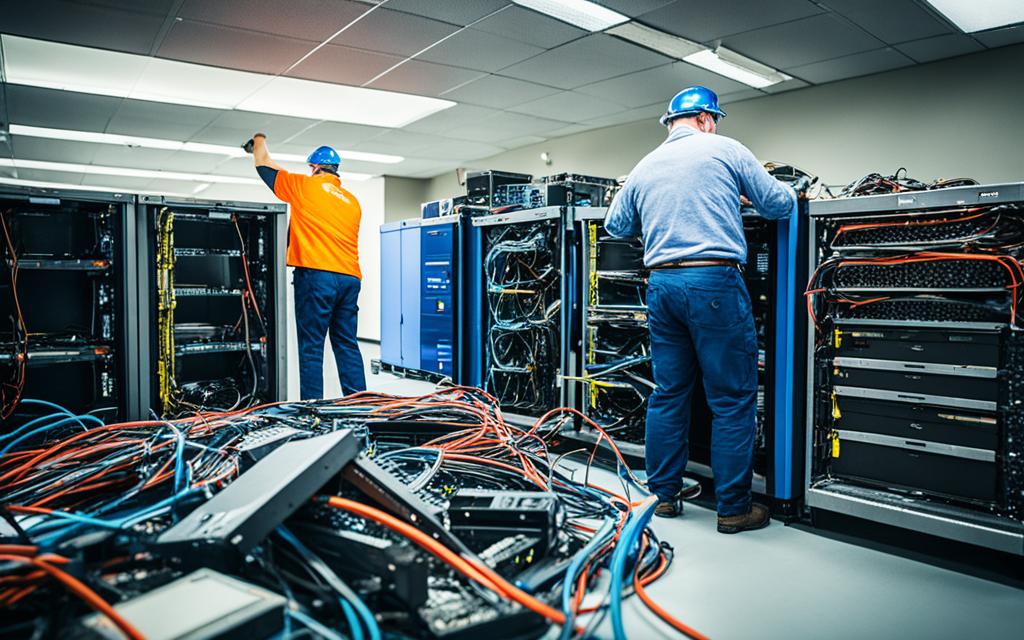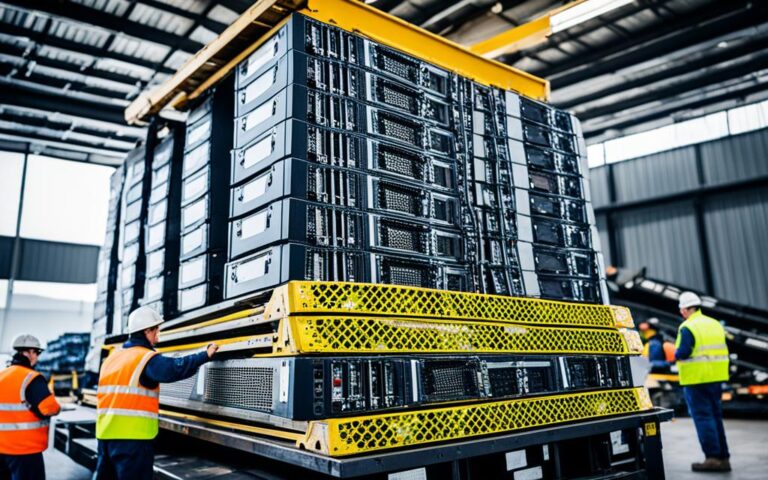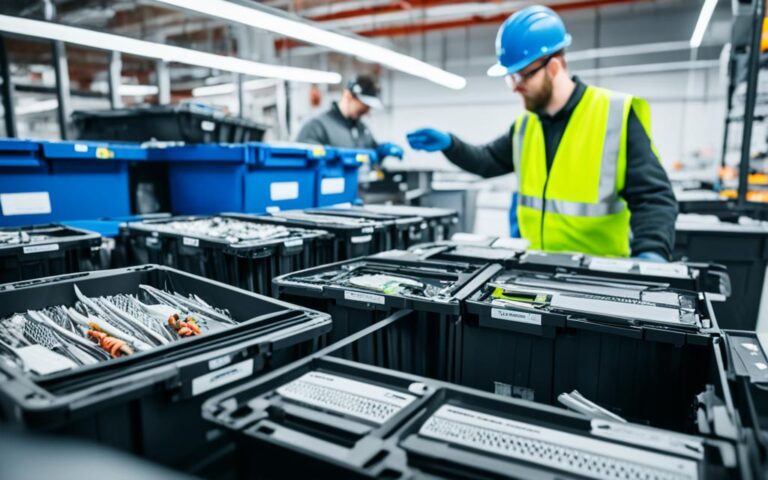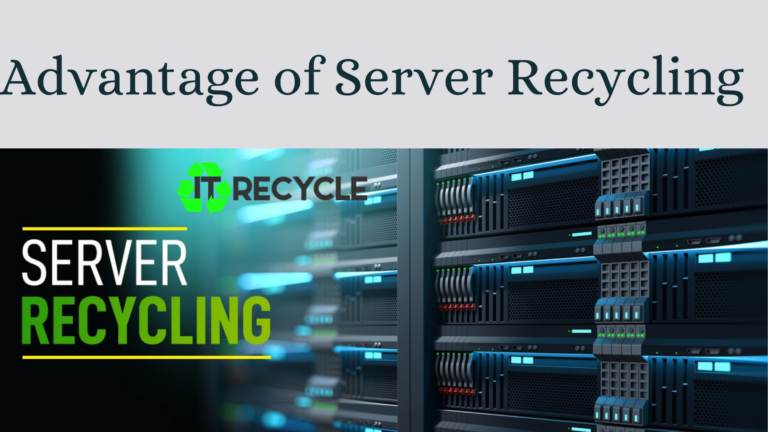How to Choose a Responsible Server Recycling Vendor
Are you looking for a sustainable solution to dispose of your decommissioned servers? Server recycling is the answer. By recycling your servers, you not only reduce e-waste but also promote a circular economy by recovering valuable materials. However, it’s crucial to choose a reputable server recycling vendor to ensure secure and eco-friendly disposal.
The Environmental Impact of Decommissioned Servers
Decommissioned servers pose a significant environmental threat if not recycled responsibly. These servers contain hazardous materials that can harm the ecosystem if they end up in landfills or are improperly disposed of. To mitigate this environmental impact, it is crucial to recycle servers through proper channels.
Recycling decommissioned servers has several environmental benefits. One of the key advantages is the reduction of e-waste. Each year, countless servers are discarded, adding to the growing problem of electronic waste. By recycling servers, we can prevent these valuable resources from ending up in landfills and contribute to a more sustainable production cycle.
Moreover, server recycling helps minimize the release of toxic substances into the environment. Many components found in servers, such as batteries and circuit boards, contain toxic materials like lead, mercury, and cadmium. When servers are not properly recycled, these harmful substances can seep into the soil and water, polluting ecosystems and endangering wildlife.
By recycling servers, we also reduce the reliance on new resources. The production of new servers requires energy and raw materials, contributing to carbon emissions and resource depletion. By extending the lifespan of servers through recycling, we can conserve valuable resources and reduce the environmental impact associated with the manufacturing process.
In summary, the environmental impact of decommissioned servers can be significant if they are not recycled properly. Recycling servers not only prevents e-waste and pollution but also helps create a more sustainable production cycle and reduces the release of toxic substances. It is crucial for businesses and individuals alike to choose responsible server recycling practices to protect the environment and promote a greener future.
Key Takeaways:
- Decommissioned servers contain hazardous materials that can harm the environment if not recycled properly.
- Recycling servers reduces e-waste, prevents pollution, and promotes a more sustainable production cycle.
- Proper recycling minimizes the release of toxic substances and reduces the reliance on new resources.
The Benefits of Server Recycling
Server recycling offers numerous benefits, both for the environment and for businesses. By opting for server recycling, companies can contribute to reducing e-waste and lowering the carbon footprint of the technology industry. This sustainable practice conserves valuable resources and promotes a more circular economy.
Reducing E-Waste
One of the primary advantages of server recycling is the significant reduction in e-waste. Rather than sending decommissioned servers to landfill, where they can release toxic substances into the environment, recycling ensures that these devices are properly handled and reused or repurposed. By extending the lifecycle of servers through recycling, businesses can prevent them from becoming electronic waste, thus reducing their overall environmental impact.
Conserving Resources
When servers are recycled, valuable materials such as metals, plastics, and electronic components can be recovered and reused. This not only reduces the demand for new resources but also minimizes the energy and raw material extraction required for manufacturing new servers. By conserving resources through recycling, businesses can contribute to a more sustainable production cycle and help to preserve natural resources for future generations.
Lowering the Carbon Footprint
The technology industry is known for its significant carbon footprint. From manufacturing to end-of-life disposal, every stage of a server’s lifecycle requires energy consumption and contributes to greenhouse gas emissions. Server recycling helps to lower this carbon footprint by reducing the need for new server production, which is an energy-intensive process. By reusing and recycling existing servers, businesses can reduce their environmental impact and strive towards more sustainable operations.
Revenue Generation
Another benefit of server recycling is the potential for revenue generation. When servers are recycled, parts that are still functional can be refurbished and sold as used components. Valuable metals, such as gold and copper, can also be extracted and sold for their worth. This not only helps to offset the costs associated with server recycling but also provides an opportunity for businesses to generate additional income.
Enhancing Environmental Reputation
Choosing server recycling demonstrates a commitment to environmental responsibility. By actively participating in sustainable practices, businesses can enhance their reputation as environmentally conscious organizations. This can attract eco-minded partners, investors, and customers, creating a positive brand image and contributing to a more sustainable business ecosystem.
The Process of Server Recycling
Server recycling is a crucial step in ensuring a sustainable and responsible approach to IT asset disposal. The process involves several stages to guarantee secure data destruction and adherence to environmental standards.
1. Planning
In the planning stage, businesses determine the scope of the server recycling project. This includes assessing the number of servers to be recycled, their specifications, and any specific data security requirements. Proper planning minimizes disruptions to ongoing operations and ensures a smooth recycling process.
2. Sorting and Disassembly
Once the planning is complete, the servers undergo a sorting and disassembly process. This involves identifying and segregating components for reuse, recycling, or proper disposal. Qualified technicians carefully dismantle the servers, ensuring the safe removal of sensitive components that require secure data destruction.
3. Disposal and Material Recovery
After the sorting and disassembly, the server components are sent for disposal and material recovery. The components that can be reused are refurbished and made available for resale, contributing to a circular economy. Valuable metals, such as gold and copper, are extracted for recycling, reducing the need for mining raw materials.
4. Documentation and Certification
Throughout the server recycling process, proper documentation is maintained to track the handling and disposal of servers. This documentation includes certificates of secure data destruction, environmental compliance, and proper disposal. The certifications ensure transparency and accountability, giving businesses peace of mind in their choice of server recycling vendor.
| Benefits of the Server Recycling Process |
|---|
| 1. Ensures proper handling and disposal of servers |
| 2. Reduces the environmental impact of e-waste |
| 3. Recovers valuable materials for reuse and recycling |
| 4. Mitigates data security risks through secure data destruction |
| 5. Provides documentation and certification for transparency |
The Risks of Improper Server Disposal
Improper server disposal poses significant risks to both the environment and data security. When decommissioned servers are not disposed of properly, they can have detrimental effects on the ecosystem and expose businesses to potential data breaches.
Servers contain toxic substances that, if not handled correctly, can leach into the soil and water, causing pollution and damage to fragile ecosystems. The improper disposal of servers also jeopardizes data security, potentially leading to unauthorized access to sensitive information and compromising the privacy and integrity of businesses.
In order to mitigate these risks, it is crucial to choose a reputable server recycling vendor. By partnering with a trusted and certified vendor, businesses can ensure the proper handling of servers, secure data destruction, and adherence to environmental standards.
“Proper server disposal not only safeguards the environment but also protects sensitive data, ensuring the integrity and reputation of businesses.”
Responsible server recycling vendors prioritize both environmental sustainability and data security. They follow established protocols for handling, disassembling, and disposing of servers, minimizing the impact on the environment while also safeguarding businesses against potential data security risks.
Choosing a reputable server recycling vendor offers peace of mind, knowing that decommissioned servers will be properly disposed of, reducing the risk of environmental pollution and protecting sensitive information.
| Risks of Improper Server Disposal | Data Security Risks |
|---|---|
| Environmental pollution and damage to ecosystems | Potential data breaches and unauthorized access |
| Loss of public trust and reputation | Loss of critical business data |
| Non-compliance with environmental regulations | Legal and financial repercussions for data breaches |
By addressing the risks of improper server disposal, businesses can contribute to a healthier environment and mitigate potential data security vulnerabilities. Responsible disposal practices not only reflect positively on the organization’s reputation but also protect against the legal, financial, and operational consequences associated with data breaches.
Protecting the Environment and Data
Choosing a reputable server recycling vendor minimizes the risks of improper server disposal, ensuring the protection of both the environment and sensitive data. By responsibly disposing of decommissioned servers, businesses can play a crucial role in reducing e-waste, preserving natural resources, and promoting a sustainable future.
Remember, when it comes to server disposal, making the right choice isn’t just about complying with regulations – it’s about safeguarding the environment and data integrity.
IT Remarketing vs. Recycling: What’s the Difference?
When it comes to disposing of old IT equipment, businesses often face the choice between IT remarketing and electronics recycling. Both options have their merits, but understanding the differences can help you make an informed decision.
IT Remarketing: Unlocking Value and Ensuring Data Security
IT remarketing involves reselling old IT equipment to recoup some of its value. If your equipment is still valuable and in good condition, remarketing can be a lucrative option. By finding a reliable and certified vendor, you can ensure that your data security measures are in place and your sensitive information is properly protected.
“IT remarketing allows you to monetize your old IT assets while minimizing environmental impact.”
By reselling your IT equipment, you not only recover some of your initial investment but also reduce the environmental impact of disposing of perfectly usable technology. It contributes to a more circular economy by extending the lifecycle of IT assets, preventing unnecessary waste.
Electronics Recycling: Responsible Disposal and Material Reclamation
On the other hand, electronics recycling focuses on the responsible disposal of IT assets. When hardware reaches the end of its useful life or is no longer valuable, recycling is the sustainable way to ensure proper disposal.
By choosing a certified vendor for electronics recycling, you can have peace of mind knowing that your IT assets will be handled responsibly. Certified recyclers follow strict environmental standards and employ advanced methods to break down assets and reclaim valuable materials.
“Electronics recycling plays a crucial role in reducing e-waste and conserving resources.”
Through the recycling process, valuable metals and components can be recovered, reducing the need for new resources and minimizing the carbon footprint of the technology industry. Recycling is an essential step toward achieving a more sustainable future.
Making the Right Choice for Your Business
When deciding between IT remarketing and electronics recycling, consider the value and condition of your IT assets, as well as your data security requirements. If your equipment still holds significant value and you can ensure data security, remarketing may be the preferred option. However, if your assets are no longer valuable or contain sensitive information, recycling is the responsible choice.
By choosing a certified vendor for either option, you can ensure that your IT assets are handled properly, data is securely destroyed, and environmental standards are met. Responsible disposal is not only a legal requirement but also an opportunity to contribute to a more sustainable future.
How to Make Your Choice
When deciding between remarketing and recycling, it’s important to carefully consider the value of the assets and the potential data risks involved. Not all IT assets may be worth remarketing due to their age or condition, and it’s essential to assess whether the potential returns outweigh the costs and effort involved in remarketing.
Equally crucial is addressing the data security risks associated with remarketing. Protecting sensitive information should be a top priority, as improper data handling may lead to potential breaches and compromise confidential data. Ensure that proper data destruction measures are in place to safeguard your organization’s information and client privacy.
Choosing a certified vendor for both remarketing and recycling is key to ensuring responsible IT asset disposal. Not only does it guarantee compliance with environmental regulations, but certified vendors also prioritize data privacy, implementing rigorous data sanitization and destruction methods to mitigate the risks of unauthorized data access.
Factors to Consider
- The age and condition of the assets
- The potential returns from remarketing
- The costs and efforts involved in remarketing
- Data security risks and measures
- Environmental considerations
- Data privacy and compliance
“Choosing the right path between remarketing and recycling is like finding the balance between maximizing value and minimizing risks. It requires a thoughtful analysis of asset worth, data security, and commitment to environmental sustainability.”
By evaluating these factors and considering the specific needs and goals of your organization, you can make an informed decision that aligns with your values and priorities.
A Comparative Overview of Remarketing and Recycling
| Criteria | Remarketing | Recycling |
|---|---|---|
| Potential Returns | Asset value recovery through reselling | Potential revenue through sale of valuable materials |
| Data Security | Requires robust data sanitization measures | Secure data destruction ensures privacy |
| Environmental Impact | Reduces electronic waste and promotes reuse | Prevents pollution and conserves resources |
| Ease of Disposal | Efficient if assets are in good condition | Suitable for assets in any condition |
| Value vs. Risk | Potential value may outweigh data security risks | Minimizes data risks and prioritizes sustainability |
By considering the factors mentioned above and referring to the comparative table, you can confidently choose between remarketing and recycling, ensuring responsible IT asset disposal that aligns with your organization’s values and requirements.
Conclusion
Responsible IT asset disposal is crucial for reducing environmental impact and ensuring data security. Businesses must carefully choose certified server recycling vendors to guarantee proper handling, secure data destruction, and adherence to environmental standards. By selecting these reputable vendors, organizations can contribute to a more sustainable future, protect sensitive information, and comply with regulatory requirements.
Recycling old servers through certified vendors not only helps reduce electronic waste but also prevents hazardous materials from polluting the environment. Adhering to proper disposal practices conserves valuable resources and helps lower the carbon footprint of the technology industry. Additionally, recycling servers offers financial benefits through the sale of refurbished parts and valuable metals, while also enhancing a business’s reputation as environmentally responsible.
In the process of server recycling, certified IT Asset Disposition (ITAD) organizations handle the planning, sorting and disassembly, disposal and material recovery, as well as documentation and certification. These experts ensure secure data destruction and maintain proper documentation to track the handling and disposal of servers. Trusting certified vendors is crucial to mitigate the risks associated with improper server disposal, such as environmental pollution and data security breaches.
Choosing between IT remarketing and recycling depends on the value of the assets and the data security risks involved. While remarketing can be advantageous for valuable equipment with proper data security measures, responsible recycling is essential for outdated or damaged assets. To make an informed decision, businesses should partner with certified vendors who can guarantee responsible disposal and data privacy.
FAQ
Why is it important to choose a responsible server recycling vendor?
Choosing a responsible server recycling vendor ensures secure and eco-friendly disposal of decommissioned servers. It helps reduce e-waste, recover valuable materials, and promotes a circular economy.
What is the environmental impact of decommissioned servers?
Decommissioned servers contain hazardous materials that can harm the environment if not recycled properly. Recycling servers reduces e-waste, prevents pollution, and promotes a more sustainable production cycle.
What are the benefits of server recycling?
Server recycling offers environmental and economic benefits. It reduces e-waste, conserves resources, and lowers the carbon footprint of the technology industry. Recycling servers can generate revenue through the sale of refurbished parts and valuable metals.
What does the server recycling process involve?
The server recycling process involves planning, sorting and disassembly, disposal and material recovery, and documentation and certification. Certified IT Asset Disposition (ITAD) organizations handle the process, ensuring secure data destruction and adherence to environmental standards.
What are the risks of improper server disposal?
Improper server disposal poses risks to the environment and data security. Servers contain toxic substances that can leach into the soil and water, causing pollution and ecosystem damage. Improper disposal also exposes businesses to data security breaches and unauthorized access to sensitive information.
What is the difference between IT remarketing and recycling?
IT remarketing involves reselling old IT equipment to recover value, while electronics recycling focuses on breaking down assets and reclaiming materials. Remarketing can be beneficial if the equipment is still valuable and data security measures are in place. Recycling ensures responsible disposal but requires choosing a certified vendor for proper handling and data destruction.
How do I choose between remarketing and recycling?
When deciding between remarketing and recycling, consider the value of the assets and the data risks involved. Not all IT assets may be worth remarketing due to age or condition. Data security risks should be addressed to prevent potential breaches. Choosing a certified vendor ensures responsible recycling and data privacy.
Why is responsible IT asset disposal important?
Responsible IT asset disposal is crucial for reducing environmental impact and ensuring data security. Choosing a certified server recycling vendor guarantees proper handling, secure data destruction, and adherence to environmental standards. It allows businesses to contribute to a more sustainable future while protecting sensitive information and complying with regulations.














